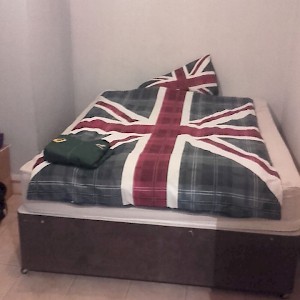Hospitality clubs
Hospitality networks gather folks who are willing to put up fellow members in their homes for free or for a small fee
Hospitality exchange networks are simple. Members get to stay in the spare bedroom of any other network member while traveling. In exchange, they are willing to similarly host other fellow members.
It's a bit like staying at a B&B only without a bill to pay at the end—though some networks have "recommended" gratuities.
What is a hospitality network stay like?
At minimum, you get a bed for the night—usually in a spare guest room; in a city apartment it might be on a fold-out couch or cot.
Sometimes you're invited to share breakfast with the host family, or dinner as well.
Sometimes your host is even willing to play tour guide and show you around his hometown.
The details are all up to the two parties involved.
Do I have to host the person who hosted me?
Hospitality exchanges do not have to be a one-to-one deal—say, you stay with Pierre in Paris, then he comes to pay you a visit several months later (though that sort of thing happens a lot).
Could be, you and Pierre have a grand old time at his apartment in Paris, then when you get home you play gracious host to Eduardo from Ecuador (who himself had Mario from Milan as a guest in his house a few months back).
How do hospitality networks work?
Hospitality exchange networks operate a little like matchmaking services (only without the love connection), allowing travelers who enjoy really getting to know the locals in a foreign land to find similarly minded folks in the places they want to visit.
You won't have strangers showing up on your doorstep unexpectedly. Stays are always arranged in advance, and always with the consent of both parties.
Are hospitality exchanges safe?
Most of these networks are de facto worldwide communities, and any member can, usually, freely post what their experience with any host was like on the website.
This means any bad eggs—horrible house guests, poor hosts, or creepy guys who mistook this for some kind of globetrotting dating service—get rooted out pretty quickly.
How much does a hospitality exchange cost?
This page deals with traditional hospitality network, in which there are two places where money might come up:
- A membership fee to belong to the network ($35 to $65)
- A small fee or gratuity paid to hosts (for some, $0; others recommended $15 to $30)
However, there are newer, online-only hospitality networks that are totally free, nicknamed Couchsurfing.
What about Servas?
Servas was founded back in 1948 by a group of committed pacifists, and the whole idea behind it is that members are genuinely interested in meeting new people from different cultures as a way to foster better understanding among the peoples in the world and further the goal of world peace. Here's part of their oath:
"I/We understand and subscribe to the goals of Servas, which are to promote peace, the unity of mankind, and mutual understanding of the cultures, outlooks, and problems of the people of the world and we will accept Servas travelers of any race, creed, sexual orientation, or nationality, and seek to have a meaningful visit with them."
So you get lofty ideals and free digs at the same time. Pretty nifty. Also, it's accredited by the United Nations as a NGO, which is a pretty darn good stamp of approval. Servas lists more than 14,000 homes and institutions in around 100 countries.
Most stays are limited to two nights, though you can stay longer if the host agrees. To join as an International Traveler costs $85 per year, plus a $25 refundable deposit to "borrow" up to five host lists—each list covers a single country or region.
You have to apply for membership, including providing character references and undergoing an interview. They're serious about you being serious about this undertaking, and you've got to prove that you think the Servas concept a swell idea in of itself, not just a way to score a free bed.
- Affordabletravelclub.net -
2,400 members—though U.K. coverage can be spotty, with just 68 members in England.
Membership: $65 for a downloaded directory; $80 for a print version. Plus $15–$30 gratuity for your hosts.
Requirements: Must be over 40; must agree to host.
- Servas.org -
An acutal UN-accrecited NGO devoted to fostering world peace through travel.
Membership: Free, buy you must submit two letters of recommendation snad undergo an interview.
- Womenwelcomewomen.uk -
2,100+ members in 86 countries, including 400+ in the U.K.
Membership: Recommended donation of £37, with annual renewal fee of £27.
Requirements: Must be female and over 18.
- Lghei.org -
500 listings in 30 countries.
Membership: €25. No fee, donation, or gratuity for hosts.
Requirements: It doesn't say you have to be gay, but I assume that's a bit of a given.








